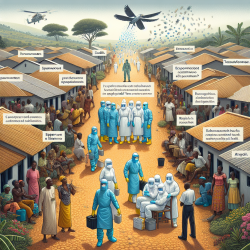Empowering Change: Lessons from the 10th Ebola Outbreak in the DRC
The 10th Ebola outbreak in the Democratic Republic of the Congo (DRC) was a significant event that not only challenged the public health infrastructure but also provided invaluable insights into managing infectious disease outbreaks. This outbreak, which took place in a conflict area, necessitated a shift from a pure public health response to a multisectoral humanitarian approach. The comprehensive study titled The cost of public health interventions to respond to the 10th Ebola outbreak in the Democratic Republic of the Congo offers a detailed analysis of the costs involved in this massive response effort.
Key Takeaways for Practitioners
For practitioners in the field of public health and those involved in disease control, the study provides several key takeaways that can enhance their skills and strategies:
- Coordination and Management: The largest share of resources was dedicated to coordination and clinical management, highlighting the importance of structured and efficient management systems in crisis situations.
- Local Capacity Building: The high unit costs for some services were partly due to low local capacity. Investing in local health systems and training local personnel can significantly reduce costs and improve response efficiency.
- Multisectoral Approach: The integration of public health responses with humanitarian efforts was crucial in addressing the complex challenges posed by the outbreak in a conflict zone.
- Cost Analysis for Future Planning: Understanding the unit costs of key interventions provides critical data for future budgeting and prioritization of disease control measures.
Encouraging Further Research
While the study offers a comprehensive cost analysis, it also opens up avenues for further research. Practitioners are encouraged to explore:
- Cost-Effectiveness Studies: Delving deeper into the cost-effectiveness of specific interventions can help in refining strategies for future outbreaks.
- Comparative Analysis: Comparing the response strategies and costs of different outbreaks can yield insights into best practices and areas for improvement.
- Long-Term Impact Studies: Investigating the long-term impacts of such interventions on local health systems and communities can inform sustainable health policies.
Conclusion
The 10th Ebola outbreak in the DRC serves as a powerful case study for public health practitioners worldwide. By learning from the strategies implemented and the costs involved, we can better prepare for future health emergencies. The emphasis on local capacity building and a multisectoral approach are particularly relevant for enhancing the resilience of health systems in similar contexts.
To read the original research paper, please follow this link: The cost of public health interventions to respond to the 10th Ebola outbreak in the Democratic Republic of the Congo.










